Questioni got my kitten declawed a few days ago. He had to stay in his cat carrier for a few days afterward. The vet called today and told us to let him out and he should be fine now. Well he's not fine and it started roughly around 4pm, he just looked sick, lethargic, walking around meowing all the time. I know Siamese are pretty vocal, but this was different, plus his eyes are watering. Now all he wants to do is sleep. A little after i gave his first meat serving of the day to him, he threw is up, and then went back and eat more, then threw that up also. At night i gave him water and he even threw that up. I'm really worried about him. He's only 10weeks old. Now he just lays there looking extra thin and weak. What could be the problem?
AnswerShawna,
The information I'm providing in this answer isn't meant to upset you and I don't feel that it's necessary to sit in judgement of other people. There are already far too many people in this world that view such behaviour as their right. All that I'm hoping to do in this answer is to help as many cats as I can by providing as many pet parents as possible with humane education about a variety of topics as a volunteer on the Allexperts site. I believe that knowledge is power and education is the key to making this world a better, more harmonious place. Throughout the years I've provided a safe, quiet, gentle foster home for countless cats and kittens. I've made a big effort to learn about what it takes to rehabilitate a variety of kitties of all ages with a variety of behavioral issues. I've also made it my mission to try and rescue stray, unwanted, abused and abandoned cats and kittens, rehabilitate them and find them suitable forever families and one thing that's always stood out for me is the fact that most pet parents are unwilling to deal with behavioural issues such as soiled carpeting, bedding or other household items or the liability issues that go along with housing a cat that can be aggressive if s/he's not treated carefully by a gentle, experienced person. Sadly it's been my experience that there are countless cats and kittens with serious behavioural issues that seem to be more common in declawed cats such as soiling outside of the litter boxes provided (if there's no medical reason to explain what's happening & the litter trays are properly maintained and filled with UNscented clumping kitty litter since many cats find scented products like air fresheners and scented litter offensive because their sense of smell is much more sensitive than our own) and biting which seems to become an issue relatively quickly after a cat has been declawed. It is my hope that the attempts at humane education in this answer will help you and your kitty to have th best possible relationship with your kitty filled with fulfilling and pleasant experiences. It is my sincere hope that the information in this answer will help other pet parents out as much as possible so that they can have the most rewarding relationship possible with their cats/kittens.
There could be a number of things happening with this little guy and some of them are directly related to having him declawed. It's quite possible that the sudden change in your kitten's demeanor and energy levels was related directly to the fact that he's in quite a bit of pain and hasn't received adequate pain control. It's also quite possible that your little guy's surgery wasn't properly done and a small amount of bone or other tissue was left behind which could well be causing pain similar to what we'd experience if we had to walk around with a stone in our shoe everywhere we went, if this is the case the vet will have to anesthetize the little guy again and fix his/her mistakes. Another reasonable possibility would be that your kitty lost as substantial amount of blood relative to his size which could be causing him to feel lethargic, the vet may have to hospitalize your kitty and administer a blood transfusion if this is waht's happening. Your kitten could also have an infection in his paws which would be making him fel pretty rotten, if your kitty does have an infection he should see a vet ASAP to be treated either at home or in hospital with antibiotics before things get anymore serious.
There is a possibility that has little to no connection to this kitten being declawed (beyond the fact that stress increases the chance of a kitty getting sick), your kitty could very well have a viral or bacterial infection that's making him so sick. Ultimately I really do think that the vet should assess this kitty for any signs of illness, infection or anemia (can be caused by blood loss) ~ if none of these are found then my recommendation would be to ask your vet about putting your kitten on some pain medicine to see how he responds. Hopefully you'll notice a big difference in how he's doing overall.
It's not a bad idea for you to consider seeking out the services of a homeopathic vet or a holistic vet trained in homeopathy (and experienced in treating cats if possible) because homeopathic remedies are very gentle and safer to use on the entire family (even the human family members can benefit if needed). Overall I've got a holistic vet who has extensive training in homeopathy and I have to admit that I've seen incredible things happen for our cats (as well as some foster kitties along the way) when conventional medicine was out of options. I credit my vet's use of homeopathy with the survival of our eldest kitty during the Menu Foods pet food recalls of 2007 (we were feeding an exceptionally well known food that's routinely recommended by vets because we were under the impression that we were feeding the best quality food available, that's changed now and we feed a properly balanced species appropriate homemade diet & we also feed a high quality canned cat food from time to time). Our eldest cat's kidneys failed to the point where euthanasia was being seriously considered and homeopathic remedies worked exceptionally well for her ~ she no longer needs any home nursing care (and she refused the prescription diet from day one) and her kidney function has been restored to 100% normal which conventional medicine alone hasn't got an explanation for.
Contrary to popular belief declawing a cat isn't as simple as amputating our fingers at the first joint. To declaw a cat isn't a simple task and there are serious risks associated with this surgery. People often compare declawing a cat to amputating our fingers at the first joint, but it's just not that simple. Human beings don't use their fingers in the same way that cats do and we don't retract our fingertips. Declaw surgery is extremely painful for the cat and it can have lasting psychological, physical and behavioral problems associated with it. The actual surgery involves amputating the cat's digits, tendons, ligaments and soft tissues at the first joint. If any tissue or bone beyond the first joint is still present it can cause a painful abscess and require the veterinarian to anesthetize the cat again and perform a second surgery in an attempt to correct the first improperly performed operation.
Declawing a cat at any age is a very painful elective surgery that's quite complex. Although I'm not a veterinarian I have seen some pretty horrible issues as a direct result of declawing ranging from some of the basic risks associated when any kind of kitty (along with people and other animals) being placed under anesthesia. There's always an element of risk associated with anesthesia ranging from serious allergic reactions to heart and kidney failure and serious blood loss. In addition to the regular risks declawing a cat or kitten at any age can potentially result in extensive blood loss which can prove fatal (what looks like a small amount of blood loss to us can prove fatal for a cat simply because they're so much smaller than we are), surgery to declaw a cat or kitten can be improperly performed which often leads to serious chronic pain for the cat as well as another trip to surgery to correct any mistakes made the first time around. In spite of all of the evidence available to back the fact that cats (and other animals) are capable of feeling pain there are still veterinarians who simply don't take the appropriate steps to manage post-operative pain while their feline patient is in the hospital as well as after they've been discharged from the veterinary hospital to go home with their human caregivers.
The first time that I saw the results of this callous attitude towards a pet was when I went with my sister to pick her newly declawed and spayed kitten up from the vet. When we arrived we were taken to the back to put the kitten into her carrier because none of the vet staff were able to calm her down enough to put her into her carrier. When we got to the back I was horrified at what I saw, this kitten was in absolute agony, she was repeatedly hitting her face and head on the steel bars of the cage and she had been doing this for long enough that her face was bleeding in some places. I immediately asked whether any pain medication had been given to alleviate the kitten's pain and the veterinarian informed me that the cost of pain medication wasn't included in the price of the spay and declaw. I was furious, I immediately told the vet to sedate the cat immediately and give her the pain medication that she should have gotten before the surgery even started. That vet wasn't too impressed with my demands, but he did as I asked (probably out of fear that I'd have his license taken from him). In this day and age there is simply no excuse for a veterinarian to run a practice this way and cut costs by neglecting to provide pain relief to pets before, during and/or after (depending on the type of surgery) any kind of surgery ~ the way that I see it is that pain relief should be provided for pets anytime they have any type of medical procedure or surgery that human beings would normally receive pain medications to alleviate their discomfort before, during and/or after surgery. I feel very strongly that it's inhumane, especially with a surgery like declawing which is well known to be extremely painful by most veterinarians, I really believe that effective pain relief for cats should be given in the hospital and for a prescribed number of days once the kitty leaves the hospital with his/her human caregiver.
I am truly disturbed to find out how many veterinarians quickly agree to declaw a cat/kitten without taking the time to help kitty caregivers understand exactly what the surgery involves, the risks associated with the surgery and the potential for serious behavioral, emotional and physical problems to emerge sometimes years after the surgery was performed. In any situation where pet parents are making major decisions I really believe that it's important for us as our pets' guardians to take the time to properly educate themselves so that they're better able to make informed decisions once they have as much information about declawing as possible. I truly believe that it's very important for pet parents to understand just how intelligent cats really are, how simple training a cat can be once you know what motivates your kitty. I also believe that there's way too little information for pet parents that provides helpful information about the humane alternatives to this cosmetic surgery.
I think it's very important that pet parents understand how important claws are to a cat's physical and psychological well-being. Cats are highly intelligent and very trainable once you discover what motivates your cat or kitten - two of my three resident cats are motivated by food rewards, they've learned that exercising claws must be confined to scratch posts and pads and I've managed to teach them several basic dog obedience commands (with silent hand signals in case they go deaf as they age). My oldest resident cat will do just about anything for praise and pets and she's also got a decent variety of basic obedience commands and hand signals. Our cats also have a full understanding of where they are and aren't permitted to go (nobody wants cats on counters, in cupboards, etc) and with the exception of a slip now and then they all know where they are allowed to exercise their claws and which areas are simply not okay for them to "sharpen" their claws. My hope for the future is that all veterinarians will be ethical enough to educate caregivers about declawing and the risks associated with this surgery rather than focusing on increasing their profits (declawing a cat is a relatively quick process, but it tends to be expensive which means that lots of money gets made for minimal work). I also hope that pet parents will have an opportunity to learn basic training techniques so that this elective surgery isn't performed nearly as often as it is today.
Maybe some pet parents will give serious thought to this issue and try training their next cat or kitten to use scratch posts/pads and cat trees instead of exercising their claws on your furniture so that declawing is treated as a last resort. In North America the leading cause of death in cats is euthanasia performed as a direct result of behavioral issues. Many cats that become aggressive towards other pets and members of their human family or develop problems with house soiling face a number of bleak options. Some of these cats are abandoned, abused, relinquished to shelters or rescue groups or euthanized by private veterinarians.
Contrary to popular belief cats don't actually sharpen their claws when they sink their claws into furniture. Cats are actually stretching and strengthening muscles in their shoulders, back and front paws when they're clawing their scratch post or piece of furniture. Cats are very territorial animals and they communicate with each other by marking objects throughout their territory with their unique scent. When a cat 'sharpens' they're actually using scent glands located in their paws to leave a scented business card of sorts for the next cat that comes along. Cats also have scent glands in their face and the anal glands are also used for scent marking, they're located inside the cat's body on either side of the anus. Each cat's scent provides other cats with a substantial amount of information about them for other cats to take in including age, sex, reproductive status, diet and health problems.
Declawing is a cosmetic surgery for cats that's often compared to amputating human fingers at the first joint, but the surgery is somewhat more complex than that. Humans don't retract their finger tips, cats do, this means that declawing involves amputating tendons, ligaments, bone, soft tissue and the cat's nails. This is a very painful surgery - the American Veterinary Medical Association (AVMA) recommends that cats who are to be declawed be given a long acting pain reliever after they're sedated for surgery. Before the surgery begins the AVMA recommends administering nerve blocks at multiple sites in the cat's paws to numb them completely in an attempt to minimize pain levels immediately following surgery. It's also recommended that cats that have been declawed be sent home on a strong narcotic like Fentanyl administered in patch form to ensure that the cats don't experience unneccessary suffering.
Cats that have been declawed are more likely to have certain behavioral issues including litter box avoidance, biting or temperament changes. I suspect that the litter box avoidance is a result of phantom limb pain, this disorder is well documented and known to occur in human beings that have lost a limb. Since cats are quite smart my guess is that the litter box issues are a direct result of the cat trying to find a less painful place to use the toilet.
Biting in declawed cats is most likely related to the fact that they've lost their early warning system and when they become aggitated they finally resort to biting. Cats don't normally defend themselves by biting, this is strictly a last resort. In my experience cats are actually quite polite when they're attempting to communicate their desire to be left alone. Normally cats will start off by swatting the offending cat or person with carefully sheathed claws, then they gradually intensify their defense by scratching the cat or person that's bothering them. During fights between the feral/stray cats I've cared for it's been my observation that much of the heated discussions that occur are all about posturing. Intact male cats will defend their territory and discuss mating rights by engaging in displays that include caterwauling, growling and a staring contest of sorts - the winner is usually the cat who backs away first.
Some cats undergo significant changes in temperament and personality when they come home after being declawed. Not too long ago I was asked to help a woman whose kittens were littermates that had been the best of friends prior to their surgery and when they came home they couldn't be in the same room without a fight ensuing. I suspected that the fights were related to the post operative pain which meant that the vet didn't provide appropriate pain relief after the declaw surgery. I recommended that the kittens' caregiver head to the vet clinic and request pain medications for the girls that she could administer to the girls at home. I also recommended a homeopathic remedy that I routinely use in cats of all ages for a variety of situations. It wasn't long after that when I received an email letting me know that the cats were back to being best friends.
If you have any further cat related questions or concerns, please feel free to contact me again at any time and I will do my absolute best to help you and your kitty out. Right now you'll both be in my thoughts and prayers, hopefully your kitten will be feeling better soon.

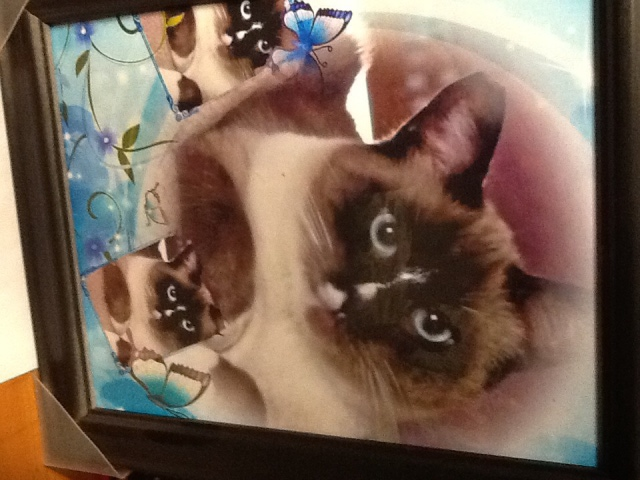 Ferel cat biting
QuestionQUESTION: I took in a ferel cat hes been here a
Ferel cat biting
QuestionQUESTION: I took in a ferel cat hes been here a
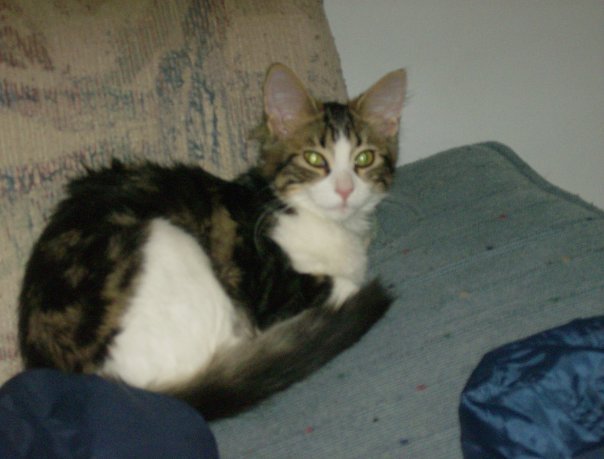 pregnat cat ??
Questionsophia
QUESTION: no one is avaible for t
pregnat cat ??
Questionsophia
QUESTION: no one is avaible for t
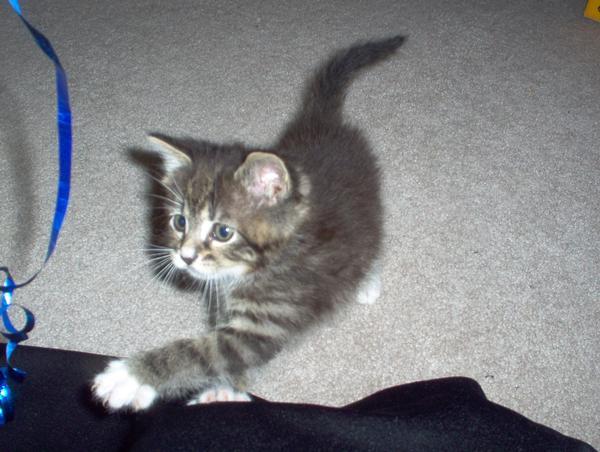 runts
Question
stubby(my cat)
Can the mother chew off
runts
Question
stubby(my cat)
Can the mother chew off
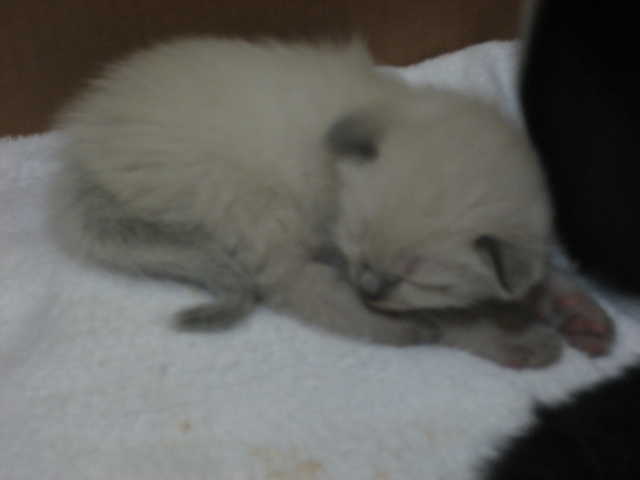 is my kitten a blue point?
QuestionPolar bear
QUESTION: hi, our black and w
is my kitten a blue point?
QuestionPolar bear
QUESTION: hi, our black and w
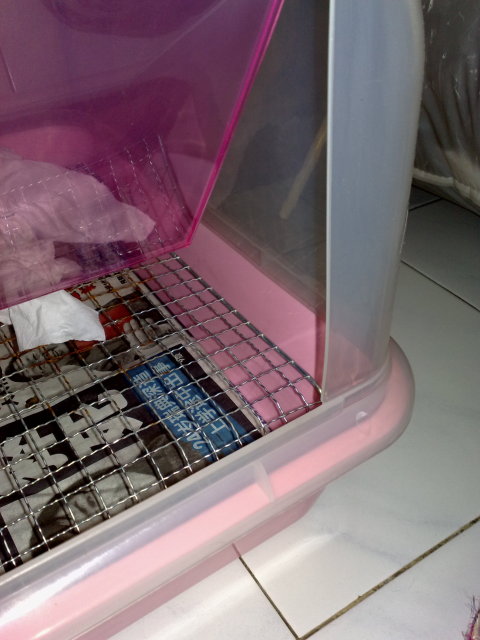 My cat doesnt piss on his litter box
QuestionLitter box
QUESTION: My 7months stray ca
My cat doesnt piss on his litter box
QuestionLitter box
QUESTION: My 7months stray ca